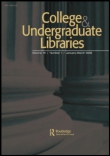
College & Undergraduate Libraries
Scope & Guideline
Advancing Knowledge in College and Undergraduate Library Services.
Introduction
Aims and Scopes
- User Engagement and Information Literacy:
A core focus of the journal is on strategies and practices that enhance user engagement, particularly in promoting information literacy among undergraduate students. This includes studies on the effectiveness of library instruction and the integration of information literacy into academic curricula. - Library Services and Technology Integration:
The journal explores the integration of technology within library services, including the use of digital tools, virtual reality, and online resources that enhance the learning experience for students. - Assessment and Evaluation:
Research published in the journal often includes assessments of library programs and services, evaluating their impact on student learning outcomes, user satisfaction, and overall academic performance. - Collaboration and Partnerships:
The journal highlights collaborative efforts between libraries and academic departments, as well as community partnerships, to enhance service delivery and resource accessibility for students. - Diversity, Equity, and Inclusion:
A significant aim of the journal is to address issues of diversity, equity, and inclusion within library services, ensuring that all students have equitable access to resources and support.
Trending and Emerging
- Open Educational Resources (OER) and Accessibility:
Research on OER has surged, emphasizing the importance of accessible educational materials for students. This trend indicates a growing commitment to reducing barriers to learning and promoting equitable access to information. - Mental Health and Library Anxiety:
The increasing focus on mental health issues, including library anxiety, highlights the role of libraries in supporting student well-being and academic success. This theme is particularly relevant as institutions recognize the importance of mental health resources. - Innovative Learning Spaces and Technology Integration:
There is a strong trend towards exploring innovative learning environments, including the use of virtual reality and augmented reality technologies in library settings, which enhance student engagement and learning experiences. - Data Literacy and Research Skills:
Emerging themes around data literacy reflect the growing need for students to develop skills in managing and interpreting data, indicating a shift in library services towards supporting research competencies. - Community Engagement and Outreach:
An increasing emphasis on community engagement suggests that libraries are looking beyond their traditional roles, aiming to foster partnerships that enhance student learning and connect with broader community needs.
Declining or Waning
- Traditional Print Collection Development:
There has been a noticeable decrease in research focused on traditional print collection development as libraries increasingly shift towards digital resources and open educational resources (OER). This reflects a broader trend in academic libraries moving away from print-centric models. - Physical Library Space Utilization:
Studies specifically addressing the utilization of physical library spaces have declined, likely due to the growing emphasis on online services and digital access, particularly in the wake of the COVID-19 pandemic. - Conventional Library Instruction Methods:
Research focusing on traditional, lecture-based library instruction methods is waning as libraries explore more interactive, technology-driven approaches to teaching information literacy. - Single-Use Technology in Libraries:
The exploration of single-use technology offerings, such as basic computer labs, has diminished as libraries adopt more versatile and innovative technology services like makerspaces and media labs.
Similar Journals
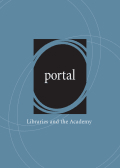
PORTAL-LIBRARIES AND THE ACADEMY
Innovating Scholarly Communication Through Library SciencePORTAL: Libraries and the Academy is an esteemed academic journal published by Johns Hopkins University Press, focusing on the intersection of library and information science, academic practice, and scholarly communication. With an ISSN of 1531-2542 and an E-ISSN of 1530-7131, this journal offers rigorous peer-reviewed research essential for librarians, researchers, and information professionals committed to enhancing academic libraries and fostering innovative practices in higher education. It holds a strong position in its field, ranking in the 61st percentile within Social Sciences and Library and Information Sciences, and categorized as Q2 in both Development and Library and Information Sciences for 2023. Though the journal is not Open Access, its content is invaluable for anyone interested in staying abreast of the latest trends and challenges in library services and academic environments. Since its inception in 2001, PORTAL has continuously contributed to the discourse on the evolving role of libraries in academia, making it a critical resource for those striving to bridge the gap between information access and higher education pedagogy.
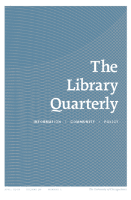
LIBRARY QUARTERLY
Connecting Ideas, Inspiring Change in Library PracticesLIBRARY QUARTERLY, published by University of Chicago Press, stands as a premier academic journal in the field of Library and Information Sciences. With an ISSN of 0024-2519 and an E-ISSN of 1549-652X, this journal has been a vital source of scholarship since its inception in 1946. Positioned in the Q1 category for its field, it ranks #79 out of 280 in Scopus, reflecting its significant influence and quality as recognized by the academic community. Although it does not offer open access, LIBRARY QUARTERLY provides an indispensable platform for research and discourse on library practices, information management, and related technologies. Its scope encompasses a wide range of topics pertinent to both traditional and emerging issues within libraries, serving as an essential resource for researchers, professionals, and students alike. By engaging with this journal, readers gain access to cutting-edge research that shapes the future of library science and inspires innovative practices within the field.
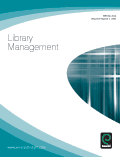
Library Management
Navigating the Future of Library Management with InsightLibrary Management, published by Emerald Group Publishing Ltd, is an esteemed academic journal dedicated to the field of Library and Information Sciences. Since its inception in 1979, the journal has continued to be a vital resource for researchers, scholars, and practitioners interested in the evolving practices of library management, information organization, and the role of libraries in the digital age. With an impressive Q1 ranking in the Library and Information Sciences category and a strong performance in Scopus metrics (ranked #85 out of 280), Library Management offers innovative insights and evidence-based research that aim to enhance library services and management practices globally. As an essential contributor to the academic and professional landscape, the journal's objectives include promoting scholarly discourse, fostering best practices, and providing a platform for cutting-edge research that addresses current challenges and opportunities in library management. Researchers and professionals in the field can access a wealth of knowledge without open access barriers, ensuring that the latest findings are available to those dedicated to advancing the discipline.
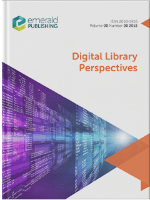
Digital Library Perspectives
Transforming Information Access in a Digital WorldDigital Library Perspectives, published by Emerald Group Publishing Ltd, is a pivotal journal in the dynamic fields of Education, Information Systems, and Library and Information Sciences. With an impressive Scopus ranking that places it in the Q1 category for Library and Information Sciences and Q2 for both Education and Information Systems, this journal has established itself as a significant resource for scholars and practitioners alike. The journal's ISSN is 2059-5816 and its E-ISSN is 2054-1694, facilitating broad accessibility to cutting-edge research and innovative practices within digital library environments. Published since 2016, it continues to offer a platform for the exploration of emerging trends, challenges, and technologies affecting digital libraries and information services. Researchers, professionals, and students will find that the journal not only highlights critical advancements but also fosters discussions around best practices and future directions in the industry. While it operates under a subscription model, it remains a crucial contributor to the scholarly dialogue in this essential sector.
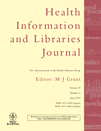
Health Information and Libraries Journal
Elevating the discourse on health information systems and library sciences.Health Information and Libraries Journal, published by WILEY, is a leading academic journal dedicated to advancing the field of health informatics and library sciences. Boasting an impactful presence, it holds a remarkable Q2 ranking in both Health Informatics and Health Information Management, and a prestigious Q1 ranking in Library and Information Sciences as of 2023. With its ISSN 1471-1834 and E-ISSN 1471-1842, the journal critically examines the intersection of information management and healthcare practices through rigorous peer-reviewed research, case studies, and insightful editorials. The journal’s focus spans topics of significant relevance, including emerging technologies, data management, and the critical role of libraries in healthcare, making it a vital resource for researchers, professionals, and students alike. With a commendable standing in Scopus rankings—positioned at #32/280 in Library and Information Sciences and #35/138 in Health Informatics—the journal continues to contribute to a deeper understanding of health information systems and their applications in contemporary settings. Given its diverse and global readership, the Health Information and Libraries Journal remains an essential platform for disseminating innovative ideas and fostering collaborative discussions in the ever-evolving landscape of health information management.
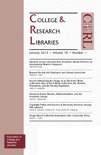
COLLEGE & RESEARCH LIBRARIES
Exploring Innovations in Library and Information ScienceCOLLEGE & RESEARCH LIBRARIES, published by the Association of College & Research Libraries, stands as a pivotal platform in the field of Library and Information Sciences. With an impressive Q1 ranking and a Scopus rank of 78 out of 280, it sits in the 72nd percentile among its peers, reflecting its significant contribution to academic scholarship. The journal, in circulation since 1939 and with *Open Access* status since its inception, is committed to disseminating high-quality research and practical insights for librarians, information professionals, and researchers. Based in the heart of Chicago, the journal provides a comprehensive overview of trends, challenges, and innovations within the library and information sector. Covering a broad spectrum of topics with converged years reflecting a rich historical context (from 1946 to 1947 and from 1987 to 2024), it facilitates discourse among practitioners and scholars aiming to advance the effectiveness of library services. Whether you are a researcher seeking to explore new methodologies or a student striving to stay informed of the latest industry developments, COLLEGE & RESEARCH LIBRARIES is your essential resource.
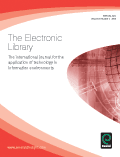
ELECTRONIC LIBRARY
Navigating the Future of Digital LibrariesELECTRONIC LIBRARY, published by EMERALD GROUP PUBLISHING LTD, serves as a pivotal resource in the realms of Library and Information Sciences as well as Computer Science Applications. Established in 1983 and continuing through 2024, this journal showcases critical research and developments that shape modern information practices and the utilization of electronic resources. With a respectable impact factor positioning it in the Q2 quartile for Library and Information Sciences and Q3 for Computer Science Applications, the journal ranks #57 out of 280 in its field, reflecting its significance within the scholarly community. Authors are encouraged to contribute innovative studies that engage with current challenges and technological advancements, ensuring that the ELECTRONIC LIBRARY remains at the forefront of academic discourse. While the journal does not currently offer open access options, it remains an essential subscription-based resource for researchers, professionals, and students seeking to deepen their understanding of digital libraries and information management.
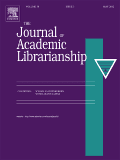
JOURNAL OF ACADEMIC LIBRARIANSHIP
Empowering the Future of Library Science.JOURNAL OF ACADEMIC LIBRARIANSHIP, published by Elsevier Science Inc, stands as a premier platform for the academic library community, dedicated to advancing research and innovation in library and information sciences. With an impressive impact factor and recognized in the Q1 category for both Education and Library and Information Sciences, this journal is essential for scholars and practitioners seeking to stay abreast of the latest trends and developments in the field. Since its inception in 1988, it has fostered a vibrant dialogue through peer-reviewed articles, case studies, and empirical research, making significant contributions to the understanding of academic librarianship practices and policies. Although not an open-access journal, its robust distribution and visibility through Elsevier's extensive network ensure wide accessibility to its critical insights. With rankings in the 83rd percentile in both Education and Library and Information Sciences, JOURNAL OF ACADEMIC LIBRARIANSHIP continues to shape the future of the profession by engaging a diverse audience of researchers, educators, and students, thereby reinforcing its position as a cornerstone of scholarly communication in the information sector.

Turkish Librarianship
Fostering Collaboration in Library ResearchTurkish Librarianship is a distinguished open-access journal published by the Turkish Librarians Association, dedicated to the scholarly examination of library and information science. Since its inception in 1987, the journal has played a vital role in promoting research, innovative practices, and knowledge sharing within the field. By providing a platform for academics, practitioners, and students, Turkish Librarianship facilitates discussions that intersect with current trends and challenges in librarianship both locally and globally. The journal draws attention to various aspects of information management, preservation practices, digital libraries, and the evolving role of librarians in a rapidly changing landscape. With an ISSN of 1300-0039 and an E-ISSN of 2147-9682, the journal aims to enrich the academic discourse and serve as a pivotal resource for those engaged in library sciences, ensuring accessibility through its open-access model. This commitment to free dissemination of knowledge not only enhances the journal’s visibility but also underscores its significance in fostering collaborative research and development in the area.

DESIDOC Journal of Library & Information Technology
Innovative Insights for the Future of Information ManagementDESIDOC Journal of Library & Information Technology, published by the Defence Scientific Information Documentation Centre, is a pivotal scholarly platform in the realm of Library and Information Sciences. The journal, indexed with ISSN 0974-0643 and E-ISSN 0976-4658, has established its reputation with a commendable Q3 category ranking in the latest Scopus quartiles and a notable rank of 113 out of 280 in its field, placing it in the 59th percentile. Engaging a global audience, it disseminates high-quality research insights aimed at advancing the practices and technologies within library and information management. Operating within a converged timeframe from 2012 to 2024, the journal is committed to fostering robust discussions surrounding contemporary issues in the field, making it an invaluable resource for researchers, professionals, and students alike. While currently not offering open access, its content is accessible through institutional subscriptions, reinforcing its significance in the academic community of India and beyond.